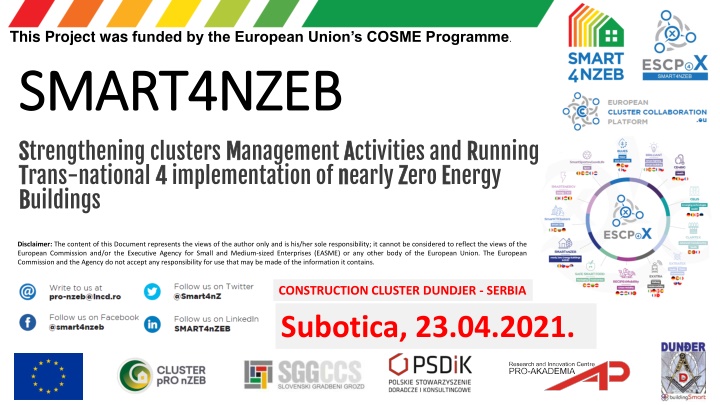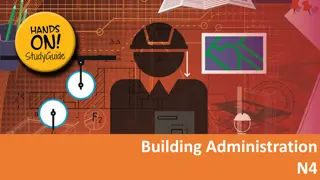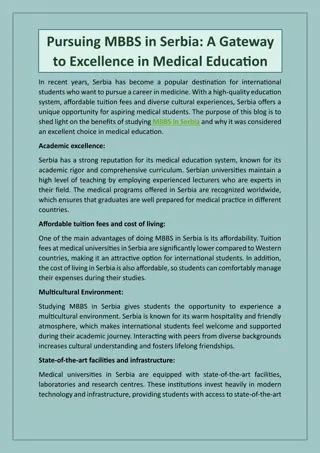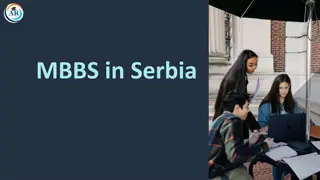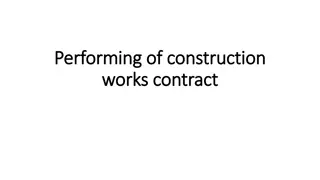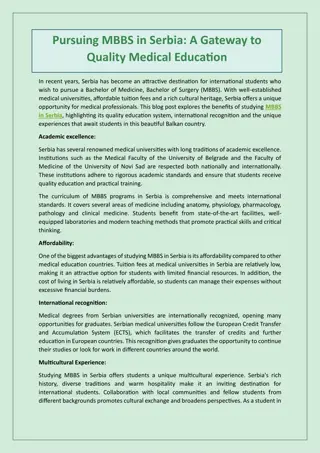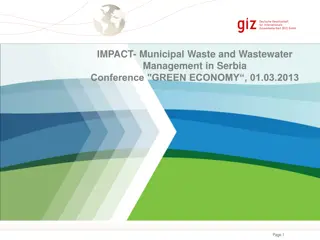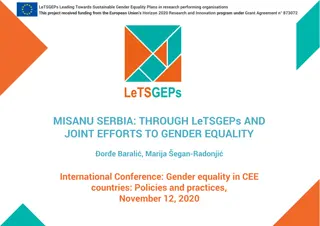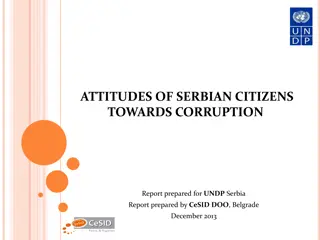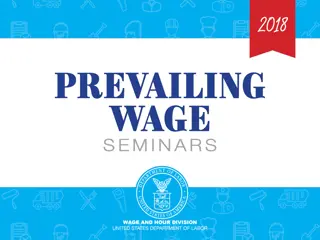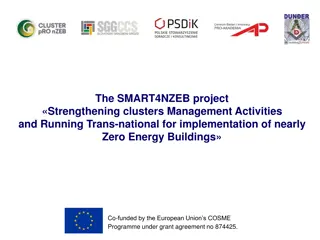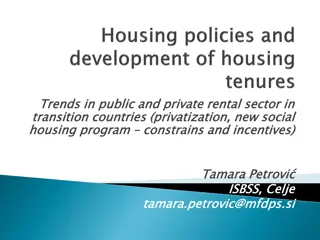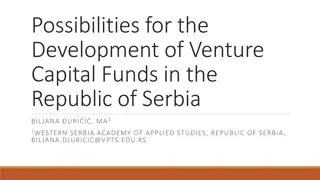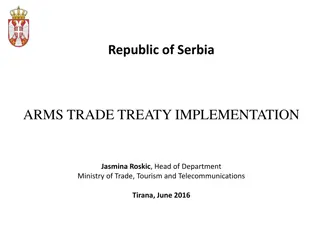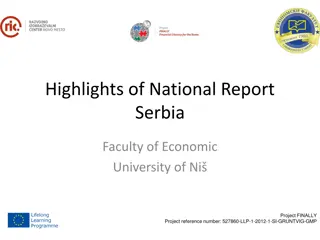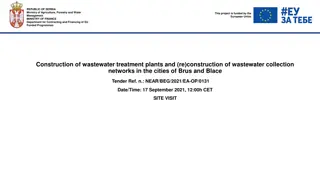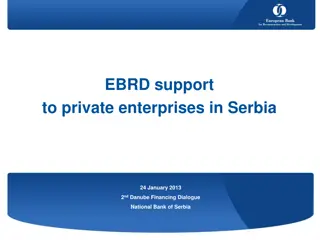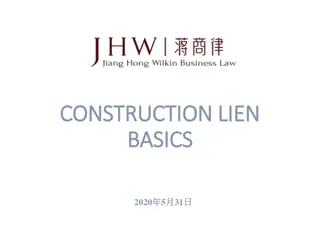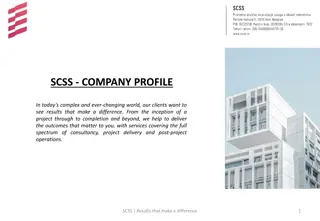SMART4NZEB Project for Sustainable Construction in Serbia
The SMART4NZEB project, funded by the European Union's COSME Programme, aims to promote nearly Zero Energy Buildings (nZEB) in Serbia. By enhancing the capacity of SMEs in the construction, energy efficiency, and renewable energy sectors, the project seeks to drive innovation and competitiveness in Central and Eastern Europe. Through strategic partnerships and exchanges, it focuses on sharing best practices and policies to address global challenges related to climate change and energy consumption.
Download Presentation

Please find below an Image/Link to download the presentation.
The content on the website is provided AS IS for your information and personal use only. It may not be sold, licensed, or shared on other websites without obtaining consent from the author.If you encounter any issues during the download, it is possible that the publisher has removed the file from their server.
You are allowed to download the files provided on this website for personal or commercial use, subject to the condition that they are used lawfully. All files are the property of their respective owners.
The content on the website is provided AS IS for your information and personal use only. It may not be sold, licensed, or shared on other websites without obtaining consent from the author.
E N D
Presentation Transcript
This Project was funded by the European Unions COSME Programme. SMART4NZEB SMART4NZEB S Strengthening clusters M Management A Activities and R Running T Trans-national 4 4implementation of n nearly Z Zero E Energy B Buildings Disclaimer: The content of this Document represents the views of the author only and is his/her sole responsibility; it cannot be considered to reflect the views of the European Commission and/or the Executive Agency for Small and Medium-sized Enterprises (EASME) or any other body of the European Union. The European Commission and the Agency do not accept any responsibility for use that may be made of the information it contains. CONSTRUCTION CLUSTER DUNDJER - SERBIA Subotica, 23.04.2021.
This Project Report was funded by the European Unions COSME Programme. Disclaimer: The content of this Document represents the views of the author only and is his/her sole responsibility; it cannot be considered to reflect the views of the European Commission and/or the Executive Agency for Small and Medium-sized Enterprises (EASME) or any other body of the European Union. The European Commission and the Agency do not accept any responsibility for use that may be made of the information it contains.
nZEB in Serbia PROJECT DESCRIPTION In the world and also in Europe, the primary energy consumption of buildings reaches about 40% of total consumption and thus significantly contributes to carbon dioxide emissions. The combination of measures to increase the energy efficiency of buildings and the use of a larger share of renewable energy in global energy consumption is a key factor in addressing global challenges related to climate change and lack of fossil fuel. In line with the amendment to the Energy Performance of Buildings Directive (EPBD), EU Member States are obliged to actively promote greater impact on the market of buildings where carbon dioxide emissions and primary energy consumption are very low or equal to zero, with a national plan with clear definitions and objectives for their Disclaimer: The content of this Document represents the views of the author only and is his/her sole responsibility; it cannot be considered to reflect the views of the European Commission and/or the Executive Agency for Small and Medium-sized Enterprises (EASME) or any other body of the European Union. The European Commission and the Agency do not accept any responsibility for use that may be made of the information it contains. application.
nZEB in Serbia The SMART4NZEB project aims to increase the competitiveness and support the growth of more than 570 small and medium-sized enterprises (SMEs) active in the construction, energy efficiency and renewable energy sectors, by strengthening the capacity of 5 representative clusters as innovation drivers in Central and Eastern Europe (Poland, Romania, Serbia and Slovenia) and with the support of international exchanges and strategic partnerships with a focus on the exchange of experiences between different practices, skills, policies, goals and levels of commitment related to the construction Disclaimer: The content of this Document represents the views of the author only and is his/her sole responsibility; it cannot be considered to reflect the views of the European Commission and/or the Executive Agency for Small and Medium-sized Enterprises (EASME) or any other body of the European Union. The European Commission and the Agency do not accept any responsibility for use that may be made of the information it contains. of nearly zero energy buildings (nZEB).
nZEB in Serbia The main goal of the SMART4NZEB project is to achieve sustainable cooperation between engaged partners and representatives of relevant actors in the nZEB market in selected Central and Eastern European countries, with the aim of developing excellence in engaged cluster management and supporting interregional partnerships to enable development of competitive products and technological solutions for new and existing buildings, which will lead to market penetration with Disclaimer: The content of this Document represents the views of the author only and is his/her sole responsibility; it cannot be considered to reflect the views of the European Commission and/or the Executive Agency for Small and Medium-sized Enterprises (EASME) or any other body of the European Union. The European Commission and the Agency do not accept any responsibility for use that may be made of the information it contains. almost zero energy consumption, in production, use and reuse.
nZEB in Serbia The proposed activities are in line with the policy and guidelines given by the Strategic Framework for European Industrial Policy - Circular Economy and Low Carbon Economy, which define areas such as NZEB, sustainable energy, renewable energy, resource efficiency, etc., and support the objectives of cooperation in smart specializations in the program "Strengthening Innovation in European Regions". This requires stronger strategic interregional cooperation, sustainable connection and investment of regional ecosystems through value chains, in order to maximize Europe's innovation potential with smart Disclaimer: The content of this Document represents the views of the author only and is his/her sole responsibility; it cannot be considered to reflect the views of the European Commission and/or the Executive Agency for Small and Medium-sized Enterprises (EASME) or any other body of the European Union. The European Commission and the Agency do not accept any responsibility for use that may be made of the information it contains. specializations and clusters.
nZEB in Serbia PROJECT SPECIFIC OBJECTIVES SO1 - Strengthening the management excellence of 5 representative clusters in Central and Eastern Europe through improving the skills of cluster managers, obtaining a certificate of cluster management excellence and improved or new developped innovation strategies, in order to ensure top quality services for their members (SMEs). SO2 - Strengthening innovative business models, marketing and sales skills for both: engaged clusters and project managers, as well as for related SMEs (cluster members). Disclaimer: The content of this Document represents the views of the author only and is his/her sole responsibility; it cannot be considered to reflect the views of the European Commission and/or the Executive Agency for Small and Medium-sized Enterprises (EASME) or any other body of the European Union. The European Commission and the Agency do not accept any responsibility for use that may be made of the information it contains.
nZEB in Serbia SO3 - Strengthen competitiveness and support growth for 577 SMEs active in the construction, energy efficiency and renewable energy sector, through harmonized services offered by clusters based on the specific needs of SMEs involved in the project. SO4 - Establishment of strategic and sustainable partnerships in the EU, through partnership strategies and joint activities such as creating a network of partnerships for cooperation of SMEs in the international market, with the participation of 55 significant factors in the cluster exchange program (ClusterXchange Program). Disclaimer: The content of this Document represents the views of the author only and is his/her sole responsibility; it cannot be considered to reflect the views of the European Commission and/or the Executive Agency for Small and Medium-sized Enterprises (EASME) or any other body of the European Union. The European Commission and the Agency do not accept any responsibility for use that may be made of the information it contains.
nZEB in Serbia SO5 - Building synergies and value chains between 3 key sectors: construction, energy efficiency (EE) and renewable energy sources (RES), encouraging the effective implementation of the nZEB (nearly Zero Energy Buildings) concept through cross-sectoral and international cooperation in the field of resource efficiency, decarbonisation . SO6 - Defining and implementing a dissemination and communication campaign to promote and use project results and promote the nZEB concept to increase demand and increase the Disclaimer: The content of this Document represents the views of the author only and is his/her sole responsibility; it cannot be considered to reflect the views of the European Commission and/or the Executive Agency for Small and Medium-sized Enterprises (EASME) or any other body of the European Union. The European Commission and the Agency do not accept any responsibility for use that may be made of the information it contains. performance of new and renovated buildings.
nZEB in Serbia The action of communication and dissemination of results will be developed in accordance with a common platform and will be adapted for implementation in each country or region, according to specific objectives, which are: -Promote training programs to increase the interest of target groups and ensure their sustainability upon completion of the project. -Increase awareness of improved / developed cluster strategies and partnerships created within the project to use the results. -Increase interest in the ClusterXchange Program by promoting its benefits in order to achieve the participation of the maximum number of Disclaimer: The content of this Document represents the views of the author only and is his/her sole responsibility; it cannot be considered to reflect the views of the European Commission and/or the Executive Agency for Small and Medium-sized Enterprises (EASME) or any other body of the European Union. The European Commission and the Agency do not accept any responsibility for use that may be made of the information it contains. candidates.
nZEB in Serbia Promote the concept of nZEB among relevant factors in order to increase the demand for nZEB and improve the quality of new and renovated buildings. Through a carefully defined and harmonized implementation of the communication and dissemination campaign, 5 cluster members will be informed, a target group for training and coaching will be provided and an effective exchange will take place during the defined program. SO7 - Promoting cluster recognition, by increasing the number of SMEs by attracting and joining 5 new SMEs in each cluster by the end of the project Disclaimer: The content of this Document represents the views of the author only and is his/her sole responsibility; it cannot be considered to reflect the views of the European Commission and/or the Executive Agency for Small and Medium-sized Enterprises (EASME) or any other body of the European Union. The European Commission and the Agency do not accept any responsibility for use that may be made of the information it contains.
nZEB in Serbia TARGET GROUP AND OTHERS INTERESTED The target group of the project is different, including various important factors: -SMEs in the fields of architecture, construction, building construction and renovation, energy efficiency, sustainable energy and renewables, energy generation and renewables, new or improved service processes, materials, manufacturers of technologies and components, creators in the circular economy in the construction sector (ie. special demolition and decomposition Disclaimer: The content of this Document represents the views of the author only and is his/her sole responsibility; it cannot be considered to reflect the views of the European Commission and/or the Executive Agency for Small and Medium-sized Enterprises (EASME) or any other body of the European Union. The European Commission and the Agency do not accept any responsibility for use that may be made of the information it contains. services).
nZEB in Serbia Public institutions (national, regional), as well as investors, users and owners. Business Networks & Representative Associations. Research, development & education institutions. Related industries, for example, special technologies related to nZEB in the agro (biofuels, use of sheep wool, reeds, straw or other renewable insulation materials), ICT (in buildings, energy management) or other sectors. Disclaimer: The content of this Document represents the views of the author only and is his/her sole responsibility; it cannot be considered to reflect the views of the European Commission and/or the Executive Agency for Small and Medium-sized Enterprises (EASME) or any other body of the European Union. The European Commission and the Agency do not accept any responsibility for use that may be made of the information it contains.
nZEB in Serbia WORK METHODOLOGY AND WORK PACKAGES The work methodology includes activities such as identifying the types of services that create the greatest added value and ways of performing these services in the most efficient way. These ancillary services may cover, inter alia, efforts to promote internationalization, market research, technology and knowledge transfer and innovation adoption, advanced technologies, digitization, services, new business models, as well as skills upgrades. Disclaimer: The content of this Document represents the views of the author only and is his/her sole responsibility; it cannot be considered to reflect the views of the European Commission and/or the Executive Agency for Small and Medium-sized Enterprises (EASME) or any other body of the European Union. The European Commission and the Agency do not accept any responsibility for use that may be made of the information it contains.
nZEB in Serbia Organizaciona ema projekta
nZEB in Serbia The main goal of the SMART4NZEB project is to strengthen the excellence of cluster management for 5 representative clusters in Central and Eastern Europe, through a work plan created to meet 7 specific objectives, and provide top quality services for its members - SMEs. Starting from the benchmarking analysis in which the market complexity and readiness for nZEB of each member will be performed, the performance of cluster management will be assessed in order to obtain the Cluster Management Excellence certification - bronze, silver or gold label - WP2. Disclaimer: The content of this Document represents the views of the author only and is his/her sole responsibility; it cannot be considered to reflect the views of the European Commission and/or the Executive Agency for Small and Medium-sized Enterprises (EASME) or any other body of the European Union. The European Commission and the Agency do not accept any responsibility for use that may be made of the information it contains.
nZEB in Serbia This will include identifying training needs for cluster managers and relevant factors for training program development to improve their skills by participating in training and education programs (WP3), with recommendations for future cluster development to be used in reviewing / analyzing development and innovation strategies (WP4). In the following, the work plan was created to form transnational, interregional, sectoral and cross-sectoral cooperation between clusters and their members by a specially created cluster exchange program, ClusterXchange Program (WP5). Disclaimer: The content of this Document represents the views of the author only and is his/her sole responsibility; it cannot be considered to reflect the views of the European Commission and/or the Executive Agency for Small and Medium-sized Enterprises (EASME) or any other body of the European Union. The European Commission and the Agency do not accept any responsibility for use that may be made of the information it contains.
nZEB in Serbia This is achieved through effective project coordination (WP1) and is supported by a strong communication and dissemination campaign (WP6) that will also establish sustainable cooperation between engaged partners and relevant representatives of significant actors in the nZEB market in selected countries. Work packages and their mutual relations are presented in the following figure. Disclaimer: The content of this Document represents the views of the author only and is his/her sole responsibility; it cannot be considered to reflect the views of the European Commission and/or the Executive Agency for Small and Medium-sized Enterprises (EASME) or any other body of the European Union. The European Commission and the Agency do not accept any responsibility for use that may be made of the information it contains.
nZEB in Serbia CONSORTIUM ORGANIZATIONAL STRUCTURE Cluster for the promotion of buildings with energy consumption close to zero - Pro-nZEB (https://www.pro-nzeb.ro/ ) is a non-profit association, founded in 2016, with the main goal of promoting the nZEB concept in Romania to reduce carbon dioxide emissions generated using buildings. Construction Cluster of Slovenia - SGG (http://www.sgg.si/en/ ) was founded in 2004 as a non-profit and innovation cluster with the main goal to improve the domestic and international competitiveness of its members through economic cooperation and networking, research and development (R&D) and innovation, education, training and policy action. Disclaimer: The content of this Document represents the views of the author only and is his/her sole responsibility; it cannot be considered to reflect the views of the European Commission and/or the Executive Agency for Small and Medium-sized Enterprises (EASME) or any other body of the European Union. The European Commission and the Agency do not accept any responsibility for use that may be made of the information it contains. SGG is oriented towards green and circular economy.
nZEB in Serbia The Eastern Construction Cluster Poland (http://www.budowlanyklaster.pl/en/ ) is coordinated by the Polish Advisory and Consulting Association (PSDiK) and was established in 2012 to provide systematic support to institutions and entrepreneurs in construction sector. The Bioenergy for the Region cluster in Poland (http://www.bioenergiadlaregionu.eu ) is coordinated by the Pro- Academia Research and Innovation Center and established in 2007 as cooperation platform of more than 80 companies, research institutions, local administrations. Disclaimer: The content of this Document represents the views of the author only and is his/her sole responsibility; it cannot be considered to reflect the views of the European Commission and/or the Executive Agency for Small and Medium-sized Enterprises (EASME) or any other body of the European Union. The European Commission and the Agency do not accept any responsibility for use that may be made of the information it contains.
nZEB in Serbia Construction cluster Dundjer from Serbia (http://www.dundjer.co.rs) was founded in 2008 with a focus on research, development and application of innovations in construction, the application of new materials, through numerous trainings and educations, as well as through human resources development, which should prepare the construction sector of Serbia for a successful entrance on the EU market. Among other members, 6 faculties, the University of Nis, 2 R&D organizations are included, while other members are from the construction and Disclaimer: The content of this Document represents the views of the author only and is his/her sole responsibility; it cannot be considered to reflect the views of the European Commission and/or the Executive Agency for Small and Medium-sized Enterprises (EASME) or any other body of the European Union. The European Commission and the Agency do not accept any responsibility for use that may be made of the information it contains. related industries.
nZEB in Serbia nZEB - CONCEPT AND STATUS IN EACH PARTICIPATING COUNTRY In order to stimulate the construction of energy efficient buildings, the Energy Performance of Buildings Directive (EPBD, 2010/31 / EC, revised (EU) 2018/844) provides a definition of a building with almost zero energy consumption - nearly Zero Energy Building - nZEB). The EPBD predicts that after 31 December 2020, all new buildings should be conceptually nZEB, while for public buildings the deadline is 31 December 2018 and EU countries must adopt national plans to increase the number of buildings according to the nZEB concept. Poland, Romania and Slovenia have adopted national plans to increase the NZEB and the situation by country Disclaimer: The content of this Document represents the views of the author only and is his/her sole responsibility; it cannot be considered to reflect the views of the European Commission and/or the Executive Agency for Small and Medium-sized Enterprises (EASME) or any other body of the European Union. The European Commission and the Agency do not accept any responsibility for use that may be made of the information it contains. is as follows:
nZEB in Serbia in Poland the concept of nZEB is not very popular; however, there is strong pressure to renovate buildings to turn them into energy efficient and green buildings including renewable energy sources (RES). In Serbia, there are rules and regulations relating to energy efficiency (energy passports) that are mandatory for new buildings, but there is a problem with old buildings. in Romania at the moment nZEB solutions are not considered affordable and the use of renewable energy technology in buildings is not yet in common use. in Slovenia there is a calculation methodology and implementation program in public buildings, with energy efficiency, efficient use of resources and circular economy. Disclaimer: The content of this Document represents the views of the author only and is his/her sole responsibility; it cannot be considered to reflect the views of the European Commission and/or the Executive Agency for Small and Medium-sized Enterprises (EASME) or any other body of the European Union. The European Commission and the Agency do not accept any responsibility for use that may be made of the information it contains.
nZEB in Serbia THANK YOU FOR YOUR ATTENTION Disclaimer: The content of this Document represents the views of the author only and is his/her sole responsibility; it cannot be considered to reflect the views of the European Commission and/or the Executive Agency for Small and Medium-sized Enterprises (EASME) or any other body of the European Union. The European Commission and the Agency do not accept any responsibility for use that may be made of the information it contains.
